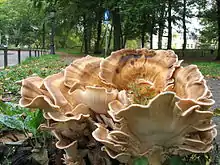Meripilaceae
The Meripilaceae are a family of fungi in the order Polyporales. The family was circumscribed by Swiss mycologist Walter Jülich in 1982 with Meripilus as the type genus.[2] A 2008 estimate placed 7 genera and 57 species in Meripilaceae.[3] As of April 2018, Index Fungorum accepts 74 species in the family.[4]
| Meripilaceae | |
|---|---|
 | |
| Meripilus giganteus | |
| Scientific classification | |
| Domain: | Eukaryota |
| Kingdom: | Fungi |
| Division: | Basidiomycota |
| Class: | Agaricomycetes |
| Order: | Polyporales |
| Family: | Meripilaceae Jülich (1982) |
| Type genus | |
| Meripilus P.Karst. (1882) | |
| Synonyms[1] | |
| |
Genera
- Grifola
- Henningsia
- Hydnopolyporus
- Meripilus
- Physisporinus
- Pseudonadsoniella – Antarctic, Argentina, Galindez Island[5]
- Rigidoporus
References
- Justo, Alfredo; Miettinen, Otto; Floudas, Dimitrios; Ortiz-Santana, Beatriz; Sjökvist, Elisabet; Lindner, Daniel; Nakasone, Karen; Niemelä, Tuomo; Larsson, Karl-Henrik; Ryvarden, Leif; Hibbett, David S. (2017). "A revised family-level classification of the Polyporales (Basidiomycota)". Fungal Biology. 121 (9): 798–824. doi:10.1016/j.funbio.2017.05.010. PMID 28800851.
- Jülich, Walter (1982). Higher Taxa of Basidiomycetes. Bibliotheca Mycologica. Vol. 85. Vaduz: J. Cramer. p. 378. ISBN 978-3768213240.
- Kirk, P.M.; Cannon, P.F.; Minter, D.W.; Stalpers, J.A. (2008). Dictionary of the Fungi (10th ed.). Wallingford, UK: CAB International. p. 418. ISBN 978-0-85199-826-8.
- Kirk, P.M. (ed.). "Species Fungorum (version 28th March 2018). In: Species 2000 & ITIS Catalogue of Life". Archived from the original on 30 April 2018. Retrieved 9 April 2018.
- Kondratyuk, T.O.; Kondratyuk, S.Y.; Morgaienko, O.O.; Khimich, W.V.; Beregova, T.V.; Ostapchenko, L. L. (2015). "Pseudonadsoniella brunnea (Meripilaceae, Agaricomycotina), a new brown yeast-like fungus producing melanin from the Antarctic; with notes on nomenclature and type confusion of Nadsoniella nigra". Acta Botanica Hungarica. 58 (3–4): 291–320. doi:10.1556/034.57.2015.3-4.5.
This article is issued from Wikipedia. The text is licensed under Creative Commons - Attribution - Sharealike. Additional terms may apply for the media files.